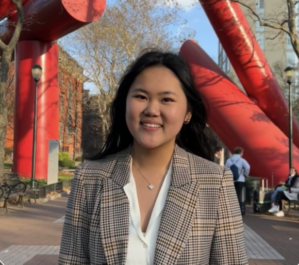 This summer, I had the opportunity to work at the Geddes Hartmann Human Lactation Research Group to research breastfeeding after Caesarean birth under the guidance of my faculty advisor, Dr. Diane Spatz at the Nursing School and Dr. Sharon Perrella and Dr. Donna Geddes at The University of Western Australia.
This summer, I had the opportunity to work at the Geddes Hartmann Human Lactation Research Group to research breastfeeding after Caesarean birth under the guidance of my faculty advisor, Dr. Diane Spatz at the Nursing School and Dr. Sharon Perrella and Dr. Donna Geddes at The University of Western Australia.
Two years ago, after a guest lecture from Dr. Spatz, I started becoming more interested in breastfeeding and its impact on the economy and public health. Through WRAP, I had the opportunity to explore this passion and examine the Western Australian (WA) healthcare landscape through a critical lens.
We investigated where mothers after Cesarean birth in Australia sought out support in breastfeeding, selecting a variety of factors: parity (whether or not they were first-time mothers or not), type of cesarean (elective or nonelective), model of care (private or public health care), and BMI (BMI>30 or BMI<30). According to the literature, we already knew that Cesarean birth was an indicator of early termination of breastfeeding, so we wanted to focus on this cohort and investigate where they sought support to inform clinical lactation support services and policy initiatives.
My role involved working on data cleaning, data analysis, conducting a literature review, and drafting and formatting sections for a manuscript for publication. Outside of my work in the lab, I shadowed my research fellow to observe her work with a local lactation consultancy and experience how her research informs practice (and vice versa). Additionally, I was able to explore and compare the impact of private and public care on breastfeeding and in doing so, learn generally about the Australian healthcare landscape.
Specifically, Perth, the capital of Western Australia was an incredible case study. As the second most isolated city in the world located in one of the most sparsely populated regions on Earth, healthcare is largely disparate and inaccessible to people in many regions. For example, for high-risk pregnancies, people in the “country” need to fly to the city using the “Royal Flying Doctor Service.”
Outside of research, I also enjoyed taking quokka selfies on Rottnest Island, sand surfing on the Lancelin dunes, and feeding kangaroos in Caversham Wildlife Park.
Overall, living in Perth and working alongside research fellows and Ph.D. students — all with an interest in lactation — was an absolute once-in-a-lifetime opportunity. If you have any research interest in any topic, I cannot recommend enough to apply to WRAP.


